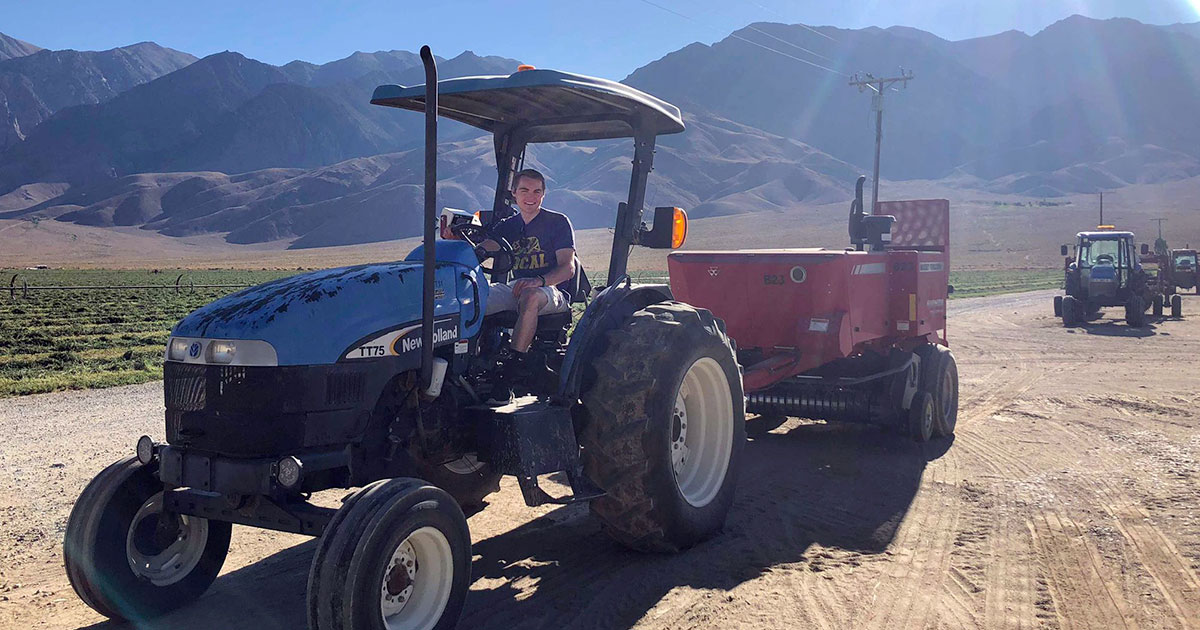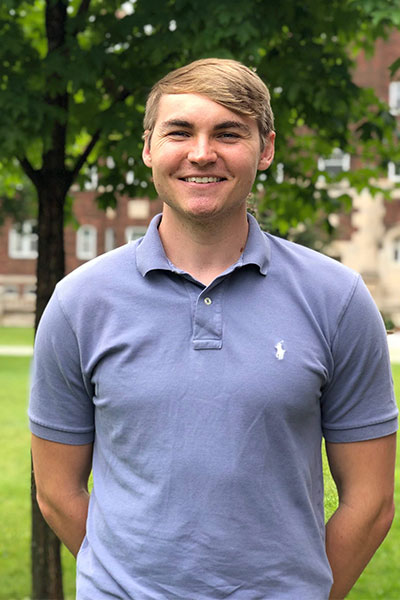Building a Food Story, Piece by Piece
- by Sam Martin

New Fellow Sam Martin driving a tractor with a hay baler at last summer’s internship, a hay ranch in Bishop, CA
I came to Pitzer College in Claremont, CA, with a high school degree and not much else — just a desire to be in nature and protect it.
Since I was a kid, I’ve found solace in the peacefulness of the outdoors, and that sentiment has stuck with me. It also led me down many paths during my undergraduate years, in which I considered ecological research, conservation work, sustainable development and planning, and even teaching as potential career fields. In my first year, I remember thinking how broad my major of “environmental analysis” was, thanks to the vast number of ways we interact with the environments that surround us and the considerable ways they also shape us and everything we know.

Sam Martin
Eventually, I grew eager to choose a specialization. Following the summer of my first year at Pitzer, I went home to San Diego. About a month into the summer, my friend watched a documentary and said it was so powerful that it influenced her to give up eating meat. Intrigued why anyone would want to do that and wanting to better understand her decision, I opted to watch the movie myself. The documentary was called “Cowspiracy: The Sustainability Secret,” and it had a deep impact on me instantly.
Watching it made me feel like a hypocrite (and as a once-careless eater, rightly so). The film forced me to realize the connection between food production and other environmental issues across the globe: pollution runoff from industrial farms using chemical fertilizers and pesticides, greenhouse gas emissions released in animal agriculture and their effect on climate, deforestation due to farmland and grazing space needs, and the list goes on. Knowing these things, I figured the best place to start was with my own actions, and I decided to become vegetarian, too.
I used the following summers to build on my relationship to and understanding of food. The summer after my sophomore year, I worked on neighboring Pomona College’s annual sustainability report and got a glimpse of a self-operated college food service model committed to sustainability. In tracking and analyzing the campus’s food purchases, I was able to see the delicate balancing act that managers and chefs deal with on a day-to-day basis to ensure healthy, delicious, sustainable, and affordable food for a campus of several thousands of students, faculty, and staff.
Last summer, I worked for a medium-sized hay ranch and learned a lot about what it takes to maintain a fruitful agriculture business. Being from a metropolitan beach town, the country lifestyle was something entirely new to me. But ready or not, the next three and a half months of my life consisted of operating and servicing 16-footwide swathers (basically, massive lawn mowers), tractors, balers, water trucks, and so on, from 4 a.m. until whenever we finished what we were doing that day. I learned so much about harvesting a unique commodity like hay as well as general agricultural techniques such as sowing seeds, rotating crops, applying fertilizer, and tilling, and about commercial sales.
After each summer, I would return to campus eager to learn more about our food system and apply my reinvigorated passion to make an impact. I found that Pitzer’s food service operator (none other than Bon Appétit!) knew a great deal about all these problems already, and its teams were leading the industry toward systematic change. For the three years that I worked for the campus sustainability office, I relished the opportunity to collaborate with the Bon Appétit team. One of my proudest achievements was contributing to the resurgence of a faltering food-recovery program by training new members, scheduling volunteers, and marketing our Food Recovery Network chapter. During that time, I also tracked relevant compost data, managed a reusable dining item checkout program for events on campus, and created informational materials for food-related events, such as a screening of “Wasted! The Story of Food Waste.”
Nearing the end of college, I looked back on my experiences and realized that almost all of them shared a common element: food! Each of my courses, projects with the dining hall, and summer internships provided complementary teachings to help me better understand the complexities of our food system. They have also driven my hunger to learn more. Now, I am ecstatic to continue my learning with Bon Appétit as a Fellow and to share these important stories with others.